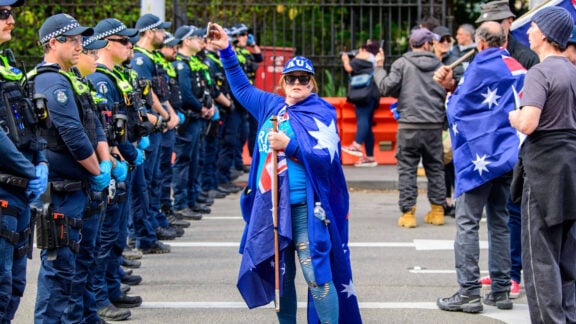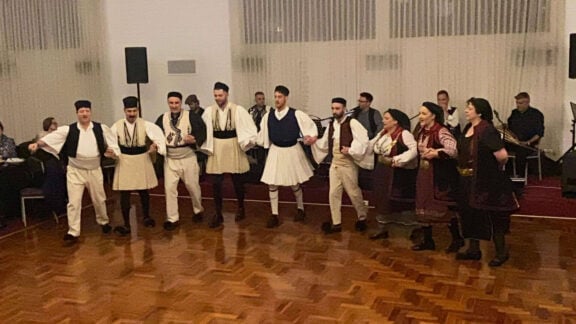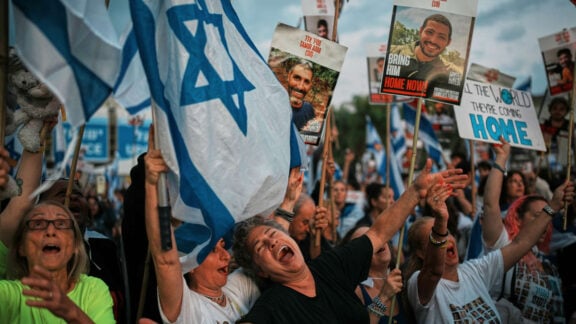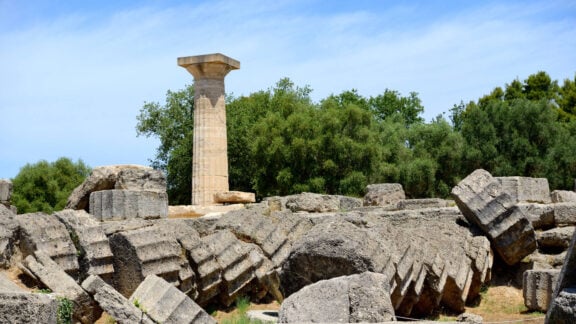My parents were born on Rhodes island, the largest of what we know as the Greek islands.
Their world came crashing down during the Holocaust when decrees were passed which declared that Jews were forbidden to attend public schools, Jewish schools were ordered to be closed, Jews were forbidden to teach, plus a raft of other measures.
My father knew it was time to leave. So he set sail for Zimbabwe, in Southern Africa, hoping to bring his parents, his teenage sisters – and Becky, his fiance. He was engaged to be married.
It wasn’t to be. His parents were murdered at Auschwitz, the largest of the Nazi death camps. His sisters survived. What of Becky, his fiance? She too had been arrested and deported to Auschwitz. That was the last my father heard of her. He wrote letter after letter to her during the Holocaust. All were returned, unopened. He was told that she had been killed and she was told that he had been killed.
Fast-forward half a century. Fifteen years ago, my father was on holiday in Cape Town – and overheard Becky’s name. The very same Becky to whom he had been engaged 50 years earlier. She had survived – and was now a grandmother living in Belgium. And my father was now a grandfather in his 80s.
To the west of Rhodes is another Greek island called Zakynthos. Before the German forces took over Rhodes, they arrived on Zakynthos and ordered the mayor, Loukas Karrer, to compile a list of the Jews on the island. Karrer consulted Bishop Chrysostomos and asked, how we can just hand them over?’. The bishop said ‘we’ll give them a list’. They went back to the German commander and handed him a piece of paper. On it were two names: their own, Bishop Chrysostomos and Mayor Karrer.
The order to arrest the Jews of Zakynthos was rescinded and the German forces withdrew – leaving intact the entire community, plus Bishop Chrysostomos and Mayor Loukas Karrer.
In the meantime, the Greek Orthodox Archbishop of Athens, Archbishop Damaskinos, was responsible for saving 10,000 Jews from the Nazis by instructing the church to take in Greek Jews fleeing the Nazis and give them sanctuary. In addition, he published a letter in which he got about 25 Greek academics, intellectuals and professionals to add their names, addressed it to the German High Command, and warned them that history would judge Germany harshly if it persisted with its demonic plan to murder the Jews of Europe. No other European leader did that.
I mention these anecdotes as part of my heritage to explain the deep and abiding connection I feel to the Greek community. It is a connection which is both personal and historical, and it relates directly to what we are doing here this evening. It is an episode which informs me as a human being and is one of the factors that prompted me to take on the position of Chair of the Community Relations Commission.
It is an honour to be here to bring good wishes from the Community Relations Commission.
The Commission is about intercultural relations. It is about respect for the fact that we are Greek Australians, African Australians, Vietnamese Australians, Australians of 170 cultures. It is about the fact that Australia is a multicultural nation, and that our diversity is our strength, and the peace within that diversity is our greatest strength.
It is about the right of all of us to be who we are – as long as we always respect everyone else to be who they are.
That is what the Commission is about, it is what Australia is about.
And as part of the multicultural tapestry which is Australia, tonight is about learning, understanding and appreciating the Greek language, the Greek culture, and underpinning that, Greek history.
I suspect that the aspects of Greek history which I have just enumerated are not widely known. Yet they are a vital part of Greek history. They demonstrated courage and principle at a time when so few possessed it.
Some years ago a lecturer at Macquarie University, Dr Robyn Moloney, said research shows that learning a second language increases cognitive power and creative thinking, and also expands the ability to communicate in one’s first language.
According to the latest census, there are 225,000 students from language backgrounds other than English enrolled in NSW public schools. But how many will be fluent in their family’s language when they leave school?
The word ‘democracy’, the concept which we cherish and which enables us to study the Greek language and literature, and to embrace Greek culture and identity in this country, is of course Greek.
Greek is the language of one of our major immigrant communities which began the process of broadening Australia’s cultural base to the unique multicultural society we are today.
Tonight we salute the educators who came together to establish this organisation, keeping an eye on the quality of the teaching of Greek at the three levels of education across the state.
We also salute the achievers who will be recognised this evening – not only for your effort, but for setting the standard of what can be achieved, thereby encouraging the next cohort to lift their input in the year ahead.
On behalf of the Community Relations Commission, we say to our Greek Australian friends here today – embrace your wonderful heritage, celebrate your wonderful culture. I congratulate all those who will be recognised this evening and wish you all great success in your future studies.
Siharitiria.
*This is the speech delivered by Mr Vic Alhadeff, Chair of the NSW Community Relations Commission, at the presentation ceremony of the 19th Annual Hellenic Studies Awards, of the Australian Hellenic Educators Association of NSW-ACT-QLT.









